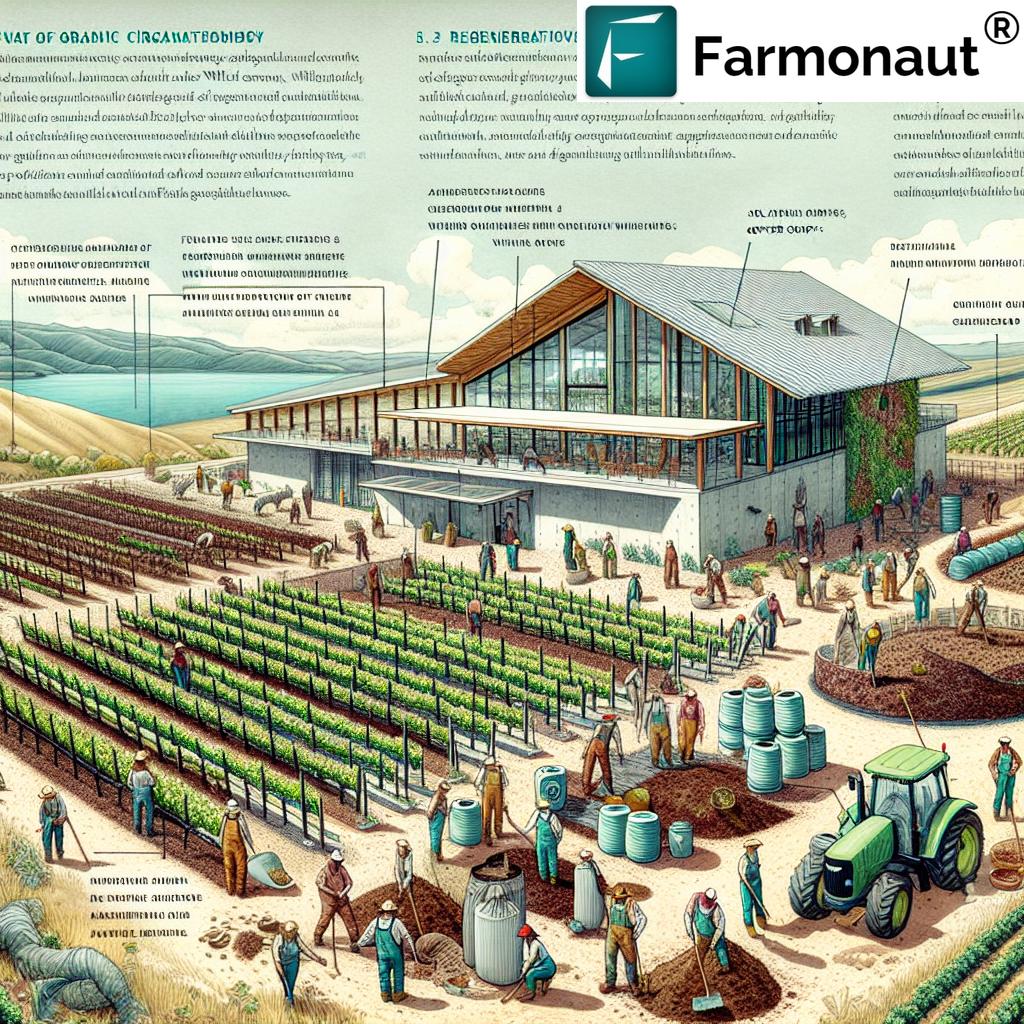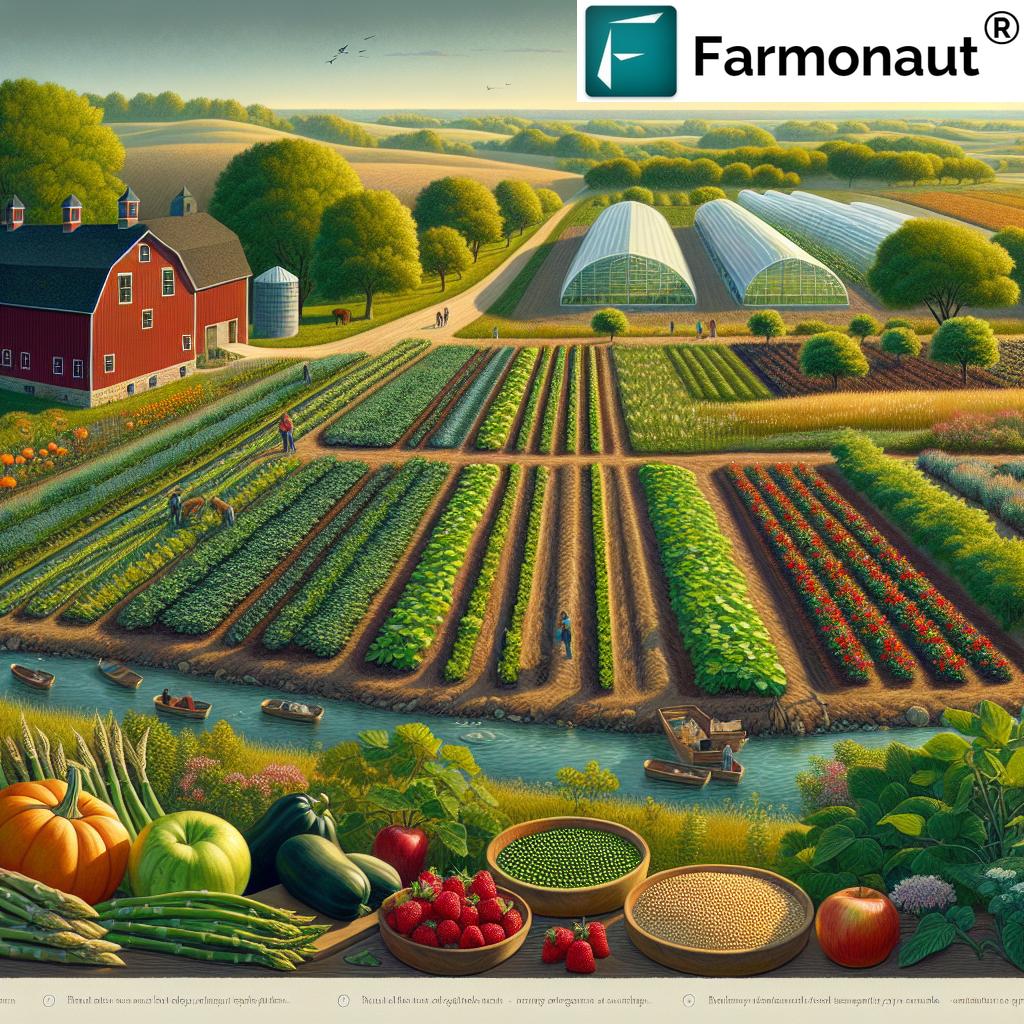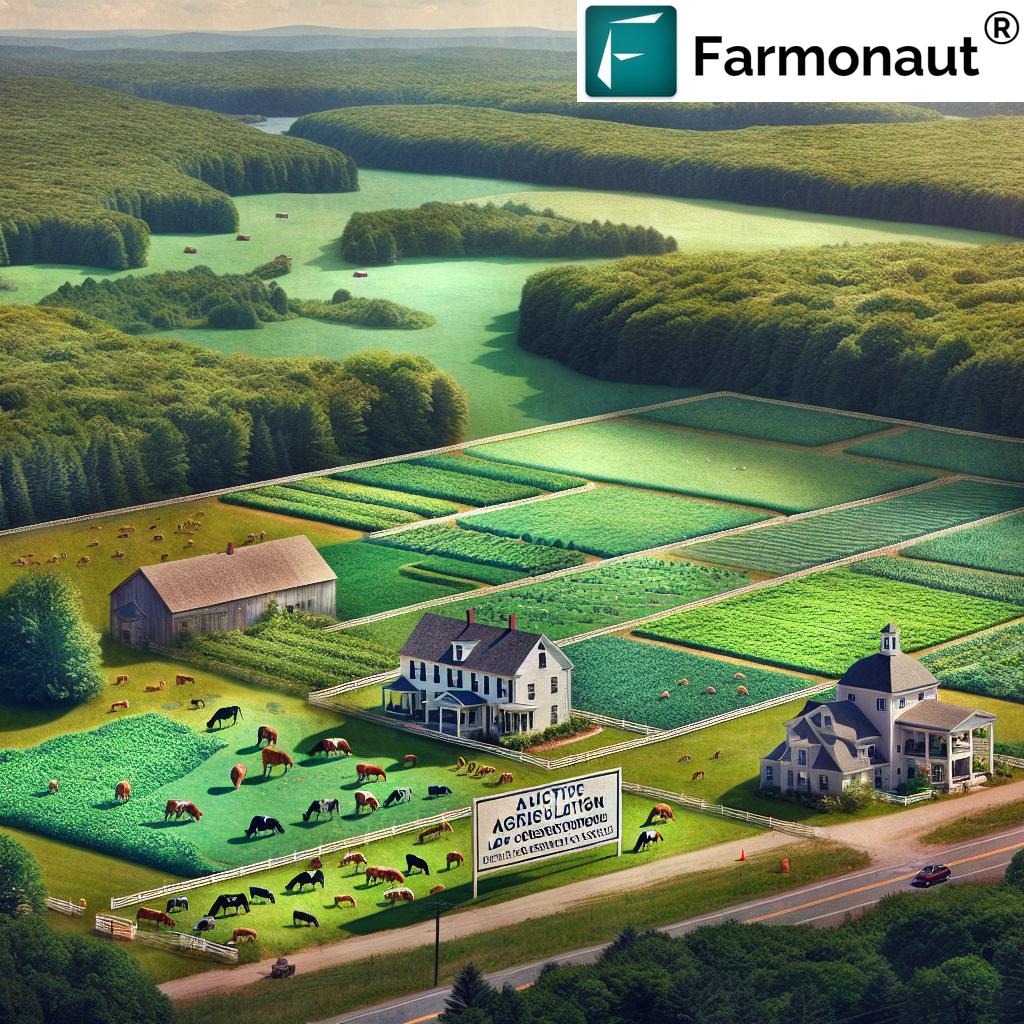Revolutionizing Paso Robles Vineyards: How Regenerative Organic Practices Are Transforming Sustainable Winemaking
“A leading Paso Robles vineyard reduced water usage by 50% through innovative sustainable viticulture techniques.”

In the heart of California’s Central Coast, nestled within the rolling hills of Paso Robles, a revolution is taking place. We’re witnessing a transformation in the world of winemaking, where regenerative organic practices are reshaping the landscape of sustainable viticulture. At the forefront of this movement is Booker Vineyard & Winery, an organic vineyard that’s setting new standards for environmental stewardship and social responsibility in the wine industry.
As we delve into the innovative approaches adopted by this pioneering winery, we’ll explore how their commitment to regenerative agriculture is not only producing exceptional wines but also nurturing the land, supporting the community, and paving the way for a more sustainable future in viticulture.
The Rise of Regenerative Organic Viticulture in Paso Robles
Paso Robles, known for its diverse microclimates and ideal grape-growing conditions, has long been a hub for wine enthusiasts. However, it’s the recent surge in organic and regenerative farming practices that’s truly putting this region on the map for sustainable winemaking.
Booker Vineyard & Winery, situated in the esteemed Willow Creek District of Paso Robles, has recently expanded its operations, acquiring a 27-acre vineyard that has now received the prestigious Regenerative Organic Certification (ROC). This certification is a testament to the vineyard’s unwavering commitment to the highest standards of soil health management and farmworker fairness.
The expansion, which came through the acquisition of Caliza Winery last summer, has allowed Booker to extend its existing certifications to the newly integrated acreage. This seamless transition was made possible due to the previous owner’s commitment to organic farming, aligning perfectly with Booker’s ethos.
The Pillars of Regenerative Organic Certification
Regenerative Organic Certification goes beyond traditional organic certifications, focusing on three key pillars:
- Soil Health: Emphasizing practices that improve soil structure, increase biodiversity, and enhance carbon sequestration.
- Animal Welfare: Ensuring that any animals involved in the farming process are treated humanely and with respect.
- Social Fairness: Prioritizing fair labor practices and community engagement.
By adhering to these principles, Booker Vineyard is not just producing high-quality wines; they’re nurturing an ecosystem that supports long-term sustainability and resilience.
Innovative Sustainable Viticulture Techniques
Under the leadership of Senior Vineyard Manager Hilary Graves, Booker has implemented a range of sustainable viticulture techniques that have dramatically reduced their environmental impact while improving wine quality:
- Vineyard Water Conservation: Through innovative irrigation methods and careful monitoring, Booker has managed to halve its water usage, a critical achievement in drought-prone California.
- Organic Pest Control Methods: Instead of relying on chemical pesticides, Booker employs natural solutions such as:
- Sheep Grazing: Using sheep to control weeds and naturally fertilize the soil.
- Falconry: Employing trained falcons to deter birds that might damage the grapes.
- Drone-Assisted Insect Deployment: Utilizing drones to release beneficial insects that prey on harmful pests.
- Cover Cropping: Planting diverse cover crops between vine rows to improve soil health, prevent erosion, and increase biodiversity.
“One organic vineyard’s regenerative practices earned it prestigious Regenerative Organic Certification, showcasing commitment to soil health and worker fairness.”

The Philosophy Behind Organic and Regenerative Approach
Eric Jensen, the founder and winemaker of Booker, began implementing organic farming practices in 2006. His philosophy is rooted in the belief that every challenge in viticulture can be addressed through organic and regenerative methods. This approach requires dedication, innovation, and a deep understanding of the vineyard ecosystem.
Jensen’s commitment to sustainability goes beyond just farming practices. It extends to every aspect of the winemaking process, from the vineyard to the cellar, and even to how they engage with the local community.
Environmental Stewardship in Winemaking
Booker’s commitment to environmental stewardship in winemaking has not gone unnoticed. The winery was recently awarded the Paso Robles Wine Country Alliance’s 2024 Environmental Steward Award, a recognition of their exceptional green practices.
This award celebrates businesses that go above and beyond in their efforts to protect and enhance the environment. For Booker, it’s a testament to their holistic approach to sustainability, which includes:
- Energy-efficient winery operations
- Waste reduction and recycling programs
- Use of sustainable packaging materials
- Promotion of biodiversity in and around the vineyard
By implementing these practices, Booker is not only producing exceptional wines but also setting a new standard for sustainable winery operations in the region.
The Impact on Wine Quality and Terroir Expression
One of the most exciting aspects of Booker’s regenerative approach is its impact on wine quality. By nurturing healthier soils and promoting biodiversity, these practices allow for a more authentic expression of terroir – the unique environmental factors that influence a wine’s character.
Regenerative organic practices contribute to:
- Improved soil structure and water retention
- Enhanced nutrient cycling and availability for vines
- Increased microbial activity in the soil
- Better resilience to climate variations
These factors combine to produce grapes of exceptional quality, resulting in wines that truly reflect the unique characteristics of the Paso Robles terroir.
The Role of Technology in Sustainable Viticulture
While Booker’s approach is rooted in traditional organic farming principles, they’re not shy about embracing technology to enhance their sustainable practices. Modern viticulture technologies play a crucial role in optimizing resource use and improving decision-making.
Some of the technologies employed include:
- Soil moisture sensors for precise irrigation management
- Weather stations for microclimate monitoring
- Drones for aerial vineyard mapping and assessment
- Data analytics for tracking and improving sustainability metrics
These technologies complement the vineyard’s organic practices, allowing for more precise and efficient management of resources.
For vineyards looking to embrace similar technologies, platforms like Farmonaut offer innovative solutions. Farmonaut provides satellite-based farm management tools that can help vineyards monitor crop health, optimize resource use, and make data-driven decisions. Their services include real-time crop health monitoring, AI-based advisory systems, and resource management tools.
For those interested in integrating such technologies into their own systems, Farmonaut offers an API for developers. You can find more information in their API Developer Docs.
Comparative Analysis: Conventional vs. Regenerative Organic Viticulture
To better understand the profound impact of regenerative organic practices, let’s compare them with conventional viticulture approaches:
| Practice Area | Conventional Approach | Regenerative Organic Approach |
|---|---|---|
| Soil Management | Chemical fertilizers, tillage | Cover cropping, composting, minimal tillage |
| Water Conservation | Standard irrigation | Precision irrigation, soil moisture retention practices |
| Pest Control | Chemical pesticides | Sheep grazing, falconry, drone-assisted insect deployment |
| Fertilization | Synthetic fertilizers | Compost, cover crops, natural amendments |
| Labor Practices | Standard labor laws | Fair wages, safe working conditions, community engagement |
This comparison highlights the holistic nature of regenerative organic viticulture, which seeks to work in harmony with natural systems rather than against them.
The Economic Viability of Regenerative Organic Viticulture
One of the most compelling aspects of Booker’s success is that it challenges the notion that sustainable farming practices are inherently more expensive or less profitable. While there may be initial investments required to transition to regenerative organic methods, the long-term benefits can lead to reduced costs and improved profitability:
- Reduced input costs for pesticides and fertilizers
- Improved soil health leading to better yields and grape quality
- Increased resilience to climate change and extreme weather events
- Premium pricing for certified organic and regenerative organic wines
- Enhanced brand value and consumer loyalty
By demonstrating the economic viability of these practices, Booker is encouraging other vineyards in Paso Robles and beyond to consider making the transition to more sustainable methods.
Community Impact and Social Responsibility
The impact of Booker’s regenerative organic practices extends beyond the boundaries of their vineyard. Their commitment to social responsibility is evident in their approach to labor practices and community engagement:
- Fair Labor Practices: Ensuring safe working conditions, fair wages, and opportunities for skill development for all workers.
- Community Education: Hosting workshops and tours to educate the local community and visitors about sustainable viticulture.
- Collaboration: Sharing knowledge and resources with other local vineyards to promote sustainable practices across the region.
- Environmental Conservation: Participating in local conservation efforts to protect and restore natural habitats.
These initiatives not only contribute to the overall well-being of the Paso Robles community but also help to build a more resilient and sustainable local economy.
The Future of Sustainable Viticulture
As we look to the future, the pioneering work of vineyards like Booker is setting the stage for a more sustainable wine industry. The success of their regenerative organic practices is inspiring other vineyards to adopt similar approaches, creating a ripple effect that could transform the entire industry.
Some key trends we can expect to see in the future of sustainable viticulture include:
- Increased adoption of regenerative organic practices across wine regions globally
- Greater integration of technology in sustainable farming practices
- More collaborative efforts between vineyards to share knowledge and resources
- Growing consumer demand for wines produced using sustainable methods
- Development of new grape varieties and cultivation techniques adapted to changing climate conditions
As these trends continue to evolve, we can look forward to a future where sustainable, high-quality wines become the norm rather than the exception.
Conclusion: A Toast to Sustainable Winemaking
The journey of Booker Vineyard & Winery in Paso Robles serves as an inspiring example of how regenerative organic practices can revolutionize the wine industry. By prioritizing soil health, biodiversity, and social responsibility, they’ve not only produced exceptional wines but also contributed to a more sustainable and resilient agricultural ecosystem.
As consumers, we have the power to support these efforts by choosing wines produced using sustainable methods. By doing so, we’re not just enjoying a great glass of wine; we’re contributing to a movement that’s transforming the way we interact with our environment and our communities.
The future of viticulture is sustainable, and it’s clear that regenerative organic practices will play a crucial role in shaping that future. As we raise our glasses to the innovative work being done in Paso Robles, we can look forward to a world where great wine and environmental stewardship go hand in hand.
FAQ Section
- What is Regenerative Organic Certification (ROC)?
ROC is a holistic agriculture certification that goes beyond organic standards, focusing on soil health, animal welfare, and social fairness. - How does regenerative viticulture improve wine quality?
By enhancing soil health and biodiversity, regenerative practices lead to healthier vines and grapes, resulting in wines with better flavor profiles and a stronger expression of terroir. - Are regenerative organic wines more expensive to produce?
While initial costs may be higher, many vineyards find that regenerative practices can lead to reduced input costs and improved profitability in the long term. - How do regenerative practices help combat climate change?
Regenerative agriculture techniques, such as cover cropping and minimal tillage, help sequester carbon in the soil, reducing greenhouse gas emissions. - Can small vineyards implement regenerative organic practices?
Yes, regenerative practices can be adapted to vineyards of all sizes, with many small vineyards finding success in transitioning to these methods.


















